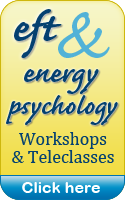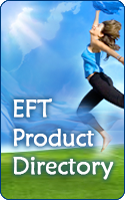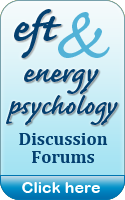Creating Empowering Reframes
By
Pamela Bruner
(Add or view comments at the bottom of the page.)
One of the tasks of a coach, and a possibility for anyone who does transformational work, is creating powerful reframes to facilitate the cognitive shift. Once someone begins to let go of anger, fear, or upset, there is often the question of ‘What now?’ Finding a new way to be, or a new action to take, is part of a reframe.
In coaching, we are taught to empower our clients by letting them make suggestions and decisions. As EFT tapping practitioners, sometimes we suggest reframes to our clients in extended setups. I have found that suggesting reframes, based on intuition, is often more effective when dealing with overcoming upset. If I ask a client how she would like to feel now, if she’s coming off of years of upset, she will often be confused and unsure. Here’s an example:
After a client has released her anger, or most of it, towards her father for his indifferent treatment of her, she may be confused about how to relate to him. After all, her ‘normal’ emotion was anger. As a practitioner, I have numerous choices. I could suggest emotions to her, such as love, respect, gratitude, etc., and sometimes those might work. But what I have found to be particularly empowering is to create the opportunity for new emotions, without dictating what they should be. Here’s the setup phrase:
Even though I’m used to feeling anger towards my father, I choose to find a new way to relate to him that works for me. I may not know what that will look like, and I may not be sure that I can do it, but I choose to create something that works for me.
Tapping reminder phrases would be (one round):
I’m used to feeling anger towards my father … Part of me thinks he deserves it … I haven’t felt another way … What other emotion is there? … I’m so used to this anger
Positive reminder phrases would be (one round):
Perhaps there is another way … What if I could find another way to relate? … What if I could relate in a way that empowers me? … I’m not sure what that could be … I could ask for help from the Universe, God , Spirit … I choose to consider that I can find a way … I choose to relate in a way that empowers me … I choose to relate in a way that works for me.
After this, a client will often suggest their new way to relate, i.e. ‘I think I could be cordial to my father’ or ‘I think that I can relate to him like an equal’ or ‘I think I could find sympathy for him’. These are all very different, and that’s fine, because they are the client’s choices. Sometimes I will do one more round, using the client’s choice, for example with the setup:
Even though I’m used to feeling anger at my father, I choose to find sympathy for him now.
With this type of Choices setup, ordinarily I would do three rounds – one negative, one positive, and one alternating. Because of the previous open-ended reframe, though, I may only do one full round, alternating the negative and positive statements. I believe that it sinks in faster, because the client is in charge!
Important points to put in an open-ended, empowering reframe:
1) Use a Choices statement. Using ‘I choose’ is empowering just by itself.
2) Allow it to be OK for the client to not have immediate answers (‘I may not know what that will look like’)
3) Allow it to be OK if the client doesn’t do this (‘I may not be sure that I can do this’)
4) Make it personal (‘I choose to create something that works for me’)
This type of reframe puts the power in the hands of the clients. It avoids the situation where they feel pushed by the practitioner – since often we are working to eliminate a trigger of being ‘told what to do’, this is especially important! And it gives the client a feeling of empowerment, because s/he has stepped into a possibility that resonates personally.
View All Articles by this Author
Author's Bio:
Pamela Bruner is a business success coach and a meridian tapping expert. She is the creator of the ‘Business Success Breakthrough Program’ which combines practical business-building advice for entrepreneurs with meridian tapping techniques such as EFT. Pamela is also the co-author of the book ‘EFT and Beyond – Cutting Edge Techniques for Personal Transformation’.
http://www.MakeYourSuccessEasy.com, http://www.BSBProgram.com
Leave a Comment
Disclaimer: All information on this website is for educational purposes only, and the content is not intended to suggest that it is a
substitute for proper medical care or good common sense.
While EFT has produced remarkable clinical results, it must still be considered to be in the experimental stage
and thus practitioners and the public must take complete responsibility for their use of it.
In addition, the articles on this site represent the views of the authors and do not necessarily reflect those of the
founder of EFT, Gary Craig, nor the owner of this web site, Stefan Gonick.
|





 EFT never ceases to amaze me! The process is gentle and often provides benefits where other methods fail.
EFT never ceases to amaze me! The process is gentle and often provides benefits where other methods fail.

